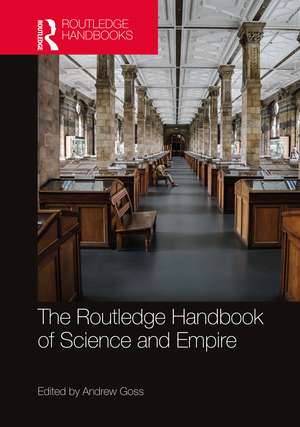The Routledge Handbook of Science and Empire
Editat de Andrew Gossen Limba Engleză Paperback – 9 ian 2023
The volume expands the history of science through careful attention to connections, exchanges, and networks beyond the scientific institutions of Europe and the United States. These 27 original essays by established scholars and new talent examine: scientific and imperial disciplines, networks of science, scientific practice within empires, and decolonised science. The chapters cover a wide range of disciplines, from anthropology and psychiatry to biology and geology. There is global coverage, with essays about China, Southeast Asia, the Pacific, Australia and New Zealand, India, the Middle East, Russia, the Arctic, and North and South America. Specialised essays cover Jesuit science, natural history collecting, energy systems, and science in UNESCO.
With authoritative chapters by leading scholars, this is a guiding resource for all scholars of empire and science. Free of jargon and with clearly written essays, the handbook is a valuable path to further inquiry for any student of the history of science and empire.
| Toate formatele și edițiile | Preț | Express |
|---|---|---|
| Paperback (1) | 313.24 lei 3-5 săpt. | +29.27 lei 7-13 zile |
| Taylor & Francis – 9 ian 2023 | 313.24 lei 3-5 săpt. | +29.27 lei 7-13 zile |
| Hardback (1) | 1483.57 lei 3-5 săpt. | +20.63 lei 7-13 zile |
| Taylor & Francis – 6 iul 2021 | 1483.57 lei 3-5 săpt. | +20.63 lei 7-13 zile |
Preț: 313.24 lei
Nou
Puncte Express: 470
Preț estimativ în valută:
59.95€ • 62.35$ • 50.24£
59.95€ • 62.35$ • 50.24£
Carte disponibilă
Livrare economică 20 februarie-06 martie
Livrare express 06-12 februarie pentru 39.26 lei
Preluare comenzi: 021 569.72.76
Specificații
ISBN-13: 9781032026534
ISBN-10: 1032026537
Pagini: 338
Ilustrații: 40
Dimensiuni: 174 x 246 x 30 mm
Greutate: 0.63 kg
Ediția:1
Editura: Taylor & Francis
Colecția Routledge
Locul publicării:Oxford, United Kingdom
ISBN-10: 1032026537
Pagini: 338
Ilustrații: 40
Dimensiuni: 174 x 246 x 30 mm
Greutate: 0.63 kg
Ediția:1
Editura: Taylor & Francis
Colecția Routledge
Locul publicării:Oxford, United Kingdom
Public țintă
PostgraduateCuprins
1. Introduction: an imperial turn in the history of science 2. Situating the empire in history of science 3. Cartography and empire from early modernity to postmodernity 4. Racial science 5. Meteorology and empire 6. Colonial psychiatry 7. Anthropology and empire 8. Natural history collections and empire 9. Non-Western collectors and their contributions to natural history, c. 1750–1940 10. Energy and empire 11. Science, empire, and the old Society of Jesus, 1540–1773 12. Networks of knowledge in the Indo-Pacific, 1600–1800 13. Between transimperial networking and national antagonism: German scientists in the British Empire during the long nineteenth century 14. Iberian science, Portuguese Empire, and cultures of inquiry in early modern europe 15. The dynamic trajectory of French colonialism and science 16. Another empire: science in the Ottoman lands 17. The planting of "colonial" science in Russian soil 18. Scientific knowledge in the Qing Empire: engaging with the world, 1644–1911 19. Empire, cultivation, and the environment in Southeast Asia since 1500 20. Science and its publics in British India 21. From history of science to history of knowledge?: themes and perspectives in colonial Australasia 22. Empires and science: the case of the sixteenth-century Iberian Empire 23. Science in early North America 24. Science, the United States, and Latin America 25. Arctic science 26. Science and decolonization in UNESCO 27. Decolonizing science and medicine in Indonesia
Notă biografică
Andrew Goss is Professor of History at Augusta University, Georgia.
Recenzii
"Overall, the handbook is an excellent resource for any scholar interested in the topic. I would recommend it to graduate students for their comprehensive exams, to course instructors to provide readings for an undergraduate class, and to scholars engaging with or looking for a quick introduction to any of these topics." - Sarah Qidwai, University of Regensburg
Descriere
This handbook expands the history of science through attention to connections, exchanges, and networks of science and empire, with a global coverage. The original essays examine: scientific disciplines, networks of imperial science, and decolonized science.
